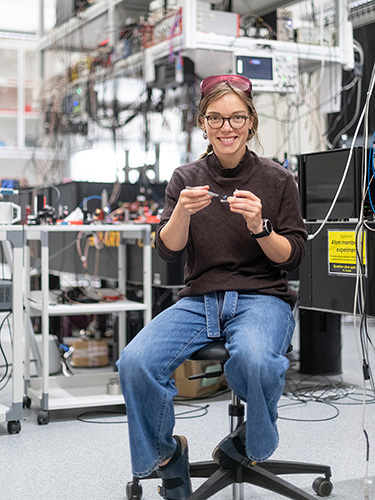Immersed in a different world.
Text: Maryse Ernzer, physicist
In the column "Why I'm passionate about my subject", young researchers talk about what excites them about their field. Maryse Ernzer is a postdoc in Philipp Treutlein's research group at the Department of Physics at the University of Basel.
How many teenagers do you know who are enthusiastic about physics? Well, I was one of them: Even in my school days, I was fascinated to learn how physicists in the early 20th century went beyond the scope of classical theories and calculated phenomena beyond the tangible world. Today, I’m an experimental physicist with a doctorate from the University of Basel under my belt.
When I began my studies, I couldn’t imagine carrying out physical experiments in a laboratory, as I wasn’t technically inclined and didn’t have any prior knowledge. Luckily, I met a researcher who was doing a doctorate in experimental physics, and she encouraged me to stick at it: Above all, what you need is the motivation to keep learning new things and the determination not to shy away from seemingly insurmountable problems.
My research topic allows me to immerse myself in a world where objects exhibit strange and surprising behavior. It’s a very special experience to access that world via experiments that you’ve designed, set up and run yourself. Our object — an extremely thin membrane of silicon nitrate — is still visible to the naked eye and but can only be picked up using tweezers and a great deal of finesse. Using laser beams, we put it into quantum mechanical states that cannot be comprehended using conventional physics.
One example is the quantum mechanical ground state — a state of the least possible mobility. The thermal vibrations that all objects undergo in everyday life are absent in the ground state, which therefore corresponds to the coldest possible temperature and is a prerequisite for observing other quantum effects, such as entanglement. Here, two particles are coupled with one another in such a way that everything that happens to one of them also happens to the other – regardless of the distance between them.
Our research group focuses on understanding and controlling the fundamentals of mechanical motion more accurately. You might think that these fundamentals had been researched a long time ago — but the more intensively we study them, the more it becomes clear that there’s still a lot to discover and understand in this field. I recently completed my doctoral thesis and hope to continue with my research. All over the world, research groups are pursuing objectives similar to ours, and I look forward to being part of this journey of discovery in the future.
More articles in this issue of UNI NOVA (November 2023).

